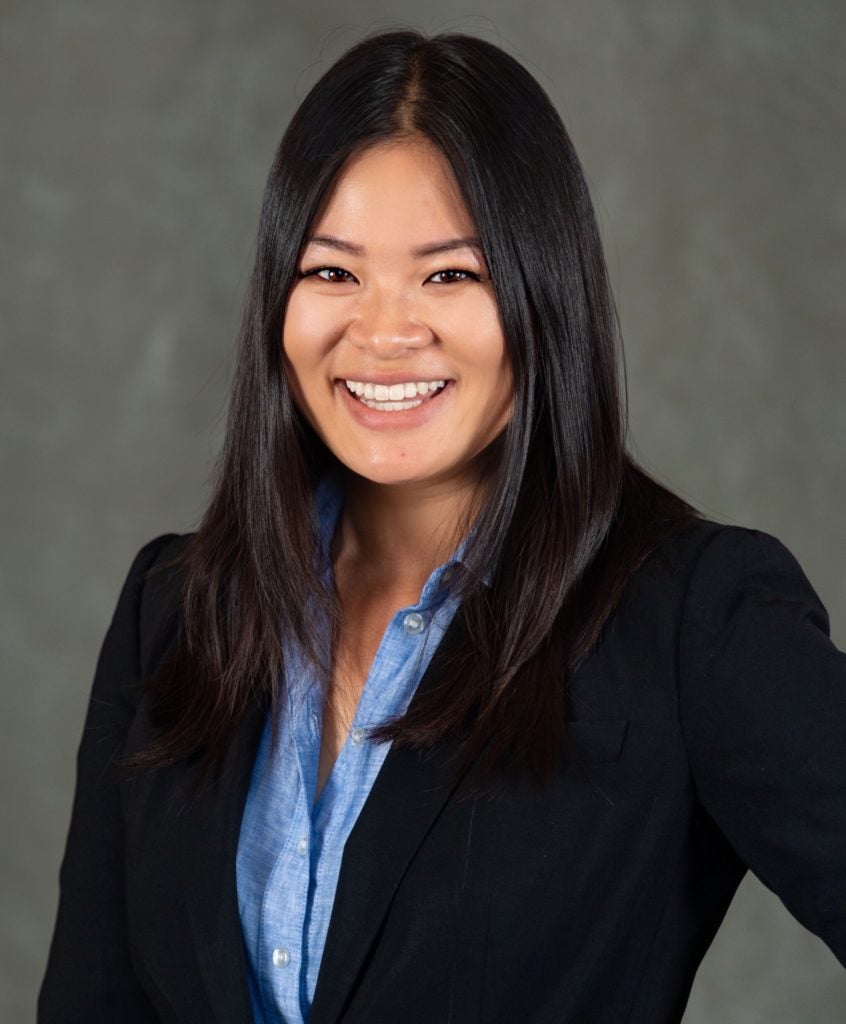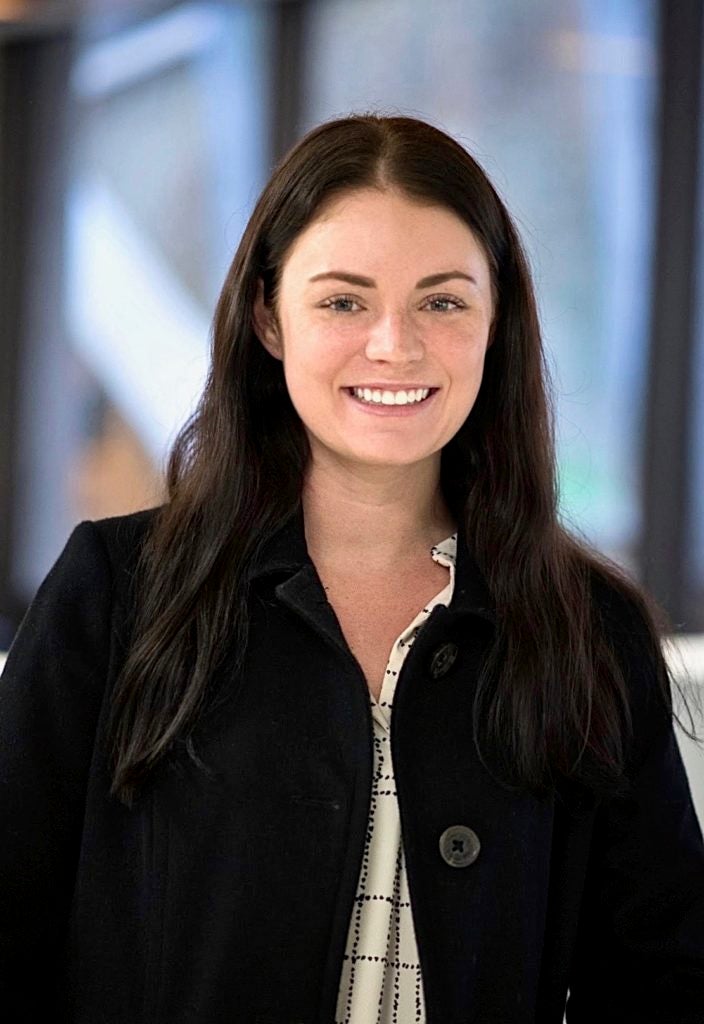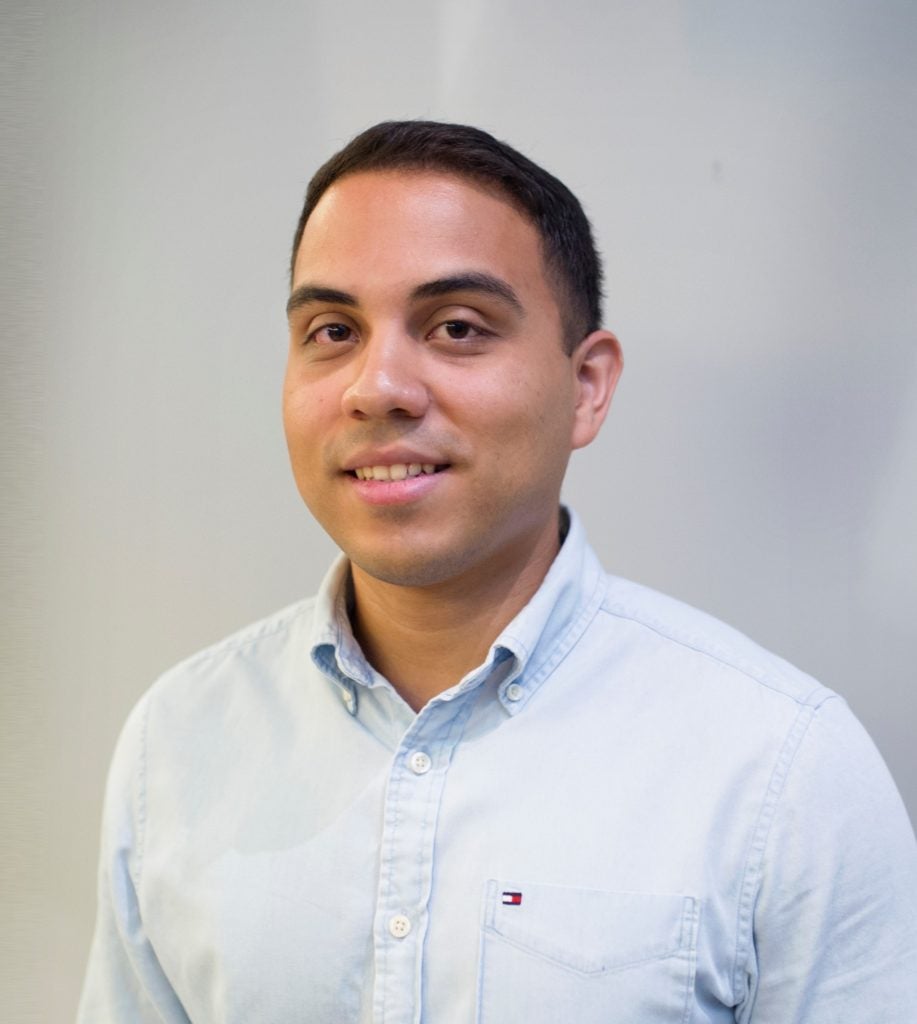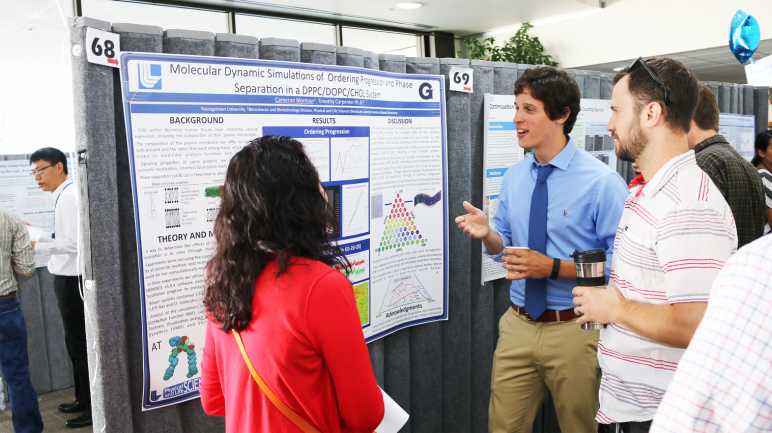COVID-19 Can’t Stop These Researchers: Fellowship Awards Students the Opportunity of a Lifetime
June 15, 2020
This summer, three recent graduates from the Georgetown University Biotechnology Master’s Program will have the opportunity of a lifetime: to virtually participate in the GU-Lawrence Livermore National Lab (LLNL) Fellowship for 8 weeks.
Founded in 1952, the Livermore Lab is a federally funded research institution which focuses on science and technology used for national security purposes. It is located in Livermore, California where its research studies are focused on areas such as bioterrorism, defense intelligence, and environmental security. When it seemed as if the world stopped spinning due to the COVID-19 pandemic, the research involved at the lab continued. Researchers had to develop novel methods to operate in a virtual environment.
I had the chance to talk to the three participants: Lauren Dam, Sara Ashley, and Mauricio Lizama, who were selected for this prestigious fellowship program. Initially, they would have started on-site in California; however, with the current pandemic, they will begin the program virtually on June 15th. Below are some of their thoughts related to the fellowship and the positives that can arise from the transition to online learning.
“There are still networking opportunities available, regardless of whether it is online or in-person.” -Lauren Dam

Lauren Dam is originally from Santa Clarita, California, and graduated from the M.S. Biotechnology program on the Entrepreneurship Track. Lauren discovered the GU-LLNL Fellowship while taking the New Frontiers in Biotechnology class, a teleconference course where LLNL scientists present their lectures from Livermore, California. As an avid networker, she was able to use her skills to talk to previous members who had participated in the program to obtain more insight into the fellowship. When asked about the specific classes that helped prepare her for this experience, Lauren mentioned that Management Strategies, taught by Matt Arnold, was instrumental in that the multiple guest speakers invited from a variety of specialized areas gave valuable insight into the industry timeline as a whole. Lauren’s accomplishments in the Biotechnology program include co-founding multiple start-ups, participating in the 2020 Yale Healthcare Case Competition, and holding leadership roles on the Biotech Executive Board, Start-Up Hoyas: MedTech, Women in Science & Education (WISE) and Women in Business. Lauren was the recipient of the prestigious Jack G. Chirikjian Award for Entrepreneurial Spirit, Intellectual Curiosity, and Innovative Aptitude, a recipient of the Entrepreneurial Leadership Award and nominated for the Exceptional Masters Student Award by the Graduate School of Arts and Sciences. Lauren will be working in the LLNL’s Innovation and Partnerships Office this summer with Dr. Hannah Farquar.
After hearing that the internship would be virtual during the summer, Lauren spent much time weighing her pros and cons of continuing with the program. Once the realities of a virtual environment crept up, Lauren was skeptical because she viewed the “on-site” experience as an important factor; past interns would tell her that there was a variety of networking opportunities to do on-site, such as conferences and day-to-day interactions with professionals. Lauren ultimately decided to pursue this opportunity for many reasons. She said that this work experience in a federal lab would complement her past private industry experience. This would enable Lauren to decide which culture is best for her future career prospects. Lauren has continued to make meaningful connections by adapting and networking through Zoom interviews during this online transition as well.
The Livermore Lab’s physical location, near the San Francisco Bay Area, is an attractive aspect of the fellowship. I asked Lauren if the physical location was an important factor when applying. Lauren is looking at postgraduate opportunities, in either big pharmaceutical or biotechnological companies. An internship in California, where many of these companies reside, appealed to her. Lauren previously completed her capstone internship at the global, multinational biopharmaceutical company, AstraZeneca in the Global Compliance and Sustainability Oncology Business Unit. California, known for its rising innovation in biotech, healthcare, and technology industries offers many career opportunities for Lauren.
“Having a mentor who took the time to explain the virtual transition and the available research projects kept us engaged and motivated.” -Sara Ashley

Sara Ashley is originally from Merritt Island, Florida, and graduated from the M.S. Biotechnology program on the BioBusiness track. Sara learned about the GU-LLNL Fellowship by talking to former members who have participated in the program. By taking the time to network with these students, Sara was able to evaluate the pros and cons of the fellowship without taking the New Frontiers in Biotechnology class. Sara’s research work at the Livermore Lab requires skills related to business development and intellectual property. Sara was a recipient of the Excellence in Entrepreneurship Award for her work where she developed and presented a pitch for a global biopharmaceutical company. The classes that helped prepare her the most for her fellowship were Marketing Applications in Biotechnology, taught by Michael Gove, as well as Intellectual Property, taught by Larry Milstein and Art House.
Although the reality of an online internship seemed discouraging at first, Sara was able to identify many positives related to a virtual experience. Financially, transitioning to an online internship saved her money (there was no need to budget for a plane ticket or housing.) This is a main challenge for students seeking out internship opportunities away from their university setting. Sara will be working in the Innovation and Partnership Office under Dr. Hannah Faquar. She explained how Hannah was instrumental in her decision to continue with the virtual fellowship. Sara mentioned how Hannah took the time to set up a Zoom meeting between the participants and was able to explain the projects that they would virtually take on during the summer.
Sara previously completed her capstone internship at the United States International Trade Commission and enjoyed working in the public sector. The fact that the Livermore Lab is a nationally recognized, federally funded lab appealed to Sara’s future career interests. She is currently seeking out career opportunities related to regulatory affairs or business development in the D.C. area.
“No matter what situation we are in, we will always be required to adapt and evolve.” -Mauricio Lizama

Mauricio Lizama is originally from Falls Church, Virginia, and graduated from the M.S. Biotechnology program on the BioBusiness Track. Mauricio has already started his fellowship and is working with PI David Rakestraw. Mauricio’s research work is focused on the concept of “Inquiry Learning.” When asked about his thoughts on this innovative type of learning, Mauricio expressed much praise for the method. He mentioned that it gives students the resources to loosely guide them during experiments and allows the ability for the students to think differently along the way. His specific research work involves evaluating model experiments at each stage to determine which experiments work, which do not work, and which are easily reproducible for a classroom environment.
The news about transitioning to an online learning environment did not sway Mauricio’s decision about whether to continue the fellowship throughout the summer or not. He decided to pursue this once-in-a-lifetime opportunity, knowing that this research work in a federal lab would be beneficial for his career path. Mauricio is interested in pursuing an MBA or JD degree in the future, and the lab experience would help with his application for future academic possibilities. An important class that helped prepare Mauricio for his internship was Government Science and Technology Management, taught by Drs. Ken Wasserman and Matthew Portnoy. He mentioned that this class helped him learn about different areas of government, and how to transition from the public to private sector.
Mauricio completed his capstone internship with Amarex Clinical Research as a business development intern. His roles included reaching out to new clients and managing their client data. Mauricio’s past experience in the private sector gave him enough knowledge related to analytical research to prepare him for his fellowship research work in the public sector.
Pairing the Students with the Mentors
Nancy Suski is the former Deputy Program Director for Intelligence, Defense, and Counterterrorism at the Lawrence Livermore National Lab. Nancy is the former Executive Director of the Master’s Program in Emergency and Disaster Management and has research interests in homeland security technology.
Nancy works with the students that are interested in the summer fellowship program that the lab offers. She lets them know about the array of opportunities available and helps match over 1000 students each summer with a specific PI at the lab, based on similar research interests. Nancy explained how the Georgetown University Biotechnology students are highly regarded throughout the years due to their exceptional work ethic and communication skills.
Nancy walked me through the typical process an intern will encounter once they receive their admission into the program. The PI’s are quick to send specific training, related to safety and health-related resources, to the interns. This gives the incoming participants the chance to become acclimated with the research techniques before they begin. The students spend their fellowship gathering information from their research work to present at the end-of-the-program poster presentation. Although the fellowship has transitioned to a virtual environment, the participants will still be expected to construct and present a poster at the conclusion of the program.
Kyle DiVito is an Assistant Professor in the Biotechnology Program at Georgetown University. Dr. DiVito recently took on the role of assisting with the GU-LLNL Fellowship application process, and works closely with Peter Luger, who manages Georgetown University’s relationships with the Livermore Lab. Both Dr. DiVito and Peter would review applications to get a feel for which research opportunities at the LLNL the students were interested in pursuing. Dr. DiVito served as a liaison between the fellowship participants from the Biotechnology Program and Peter Luger. He would keep a constant line of communication with the attendees, updating them with information regarding the fellowship’s virtual transition this summer.
Dr. DiVito was initially worried that the students would not get the full, on-site experience when they were informed that the fellowship would be virtual. Dr. DiVito mentioned that the specific departments the students were accepted into would allow for a more remote environment, as opposed to wet-lab research that would be difficult to approach virtually.
When asked about some common, shared qualities between the accepted students, Dr. DiVito specified that these students are motivated individuals with “go-getter” personalities. The fellowship immerses the participants in research work with real-life situations, while also granting them crucial federal lab experience. Many of the students go on to win awards, such as the blue-ribbon prize presented at the Summer Poster Symposium, for their research work performed at the lab.
Along with determining how to keep the fellowship operating in a virtual context, Livermore researchers have adapted and are currently contributing new methods to combat the COVID-19 pandemic. The Livermore lab, along with the American Health Association, have launched a collaborative data portal that allows scientists all over the world to access the Livermore Lab’s COVID-19 research. Their hope is that offering their research on small molecules and antibodies to other scientists will accelerate the development of a possible therapeutic.
Due to the current pandemic, there was much to restructure with respect to the summer fellowship program. Although the students are now required to complete their fellowship virtually, this does not stop the learning. The Livermore Lab has a strong biology program and was able to create analytical and computational methods to ease the online transition. Overall, Nancy, Dr. DiVito and the participants are ecstatic that this opportunity is still available.
For more information on the GU-LLNL Fellowship, contact Dr. Kyle DiVito, Assistant Professor, Biotechnology Program and visit the Office of Senior Vice President for Research’s Website and the Lawrence Livermore National Lab’s website.
Article by Tierney Sovic, Biotechnology Master’s, Class of Dec 2020
Edits by Vasna Nontanovan & Kyle DiVito
